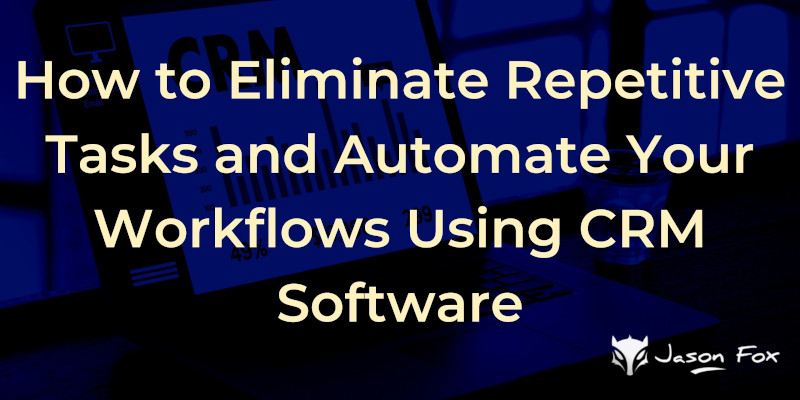Contents
The digitization of your processes and SOPs is one of the best things you can do for your real estate business.
However, it’s one thing to have a CRM tool in place to keep track of your leads and customers in a single place. Creating an ecosystem of digital tools that run independently is a whole new level.
Streamlining processes means you can engage with prospects starting from your CRM to your different channels and warm up to a sale!
This post will discuss the different responsibilities that you, as real estate professionals, can automate using various CRM solutions.
Lead Generation
Finding hot leads is the foundation of every successful marketing campaign. The goal is to acquire as many emails as you can to warm up them even more for the eventual sales.
There are different ways you can acquire leads online. The first is by setting up opt-in boxes on your site. These typically ask for the name and email addresses of visitors. Upon signing up, they can expect to receive regular newsletters or, better yet, content upgrades relevant to their needs.
Regarding the latter, you’d ideally have to create exclusive content that subscribers can download for free upon joining your mailing list. However, content upgrades give more incentive to visitors to sign up because they’ll immediately receive something of value.
Another way to acquire leads is by embedding a chat widget on your website. The widget also doubles as a tool for improving your customer support. This gives you a direct line of communication with prospects so you can immediately reply to their queries about your services or anything related to real estate.
Finally, you can create interactive quizzes to engage your prospects. Similar to opt-in boxes, there’s an incentive for quiz-takers, whether it’s getting a free exclusive guide or finding out more about themselves concerning real estate.
The great thing when using these lead generation tactics is you can automatically funnel the contacts you acquired to your CRM tool. This way, you don’t have to manually list down each person who signs up to your opt-in forms or reaches out to you.
Proposal Management
Gone are the days when you had to draft your proposals one by one, send them to your prospects, and wait impatiently for their response.
This cumbersome process paved the way for proposal management tools to help you expedite the process. Your CRM software may have the option to select the recipients of a new proposal.
When building your proposals, choose from different templates and personalize each one of them to increase your chances of conversions.
You can then save a proposal as a template and use it next time to create an offer.
Some proposal software even offers for your prospects to type in their name and use it as their signature. From here, the online proposal can then redirect them to your preferred payment gateway to process the transaction and jumpstart the project.
As you can see, automating the process of creating and signing a proposal eliminates the need for repetitive manual work. This is especially helpful when you manage multiple clients simultaneously and want to give your undivided attention to every customer.
Text Messaging
The best way to update your list about the latest properties for sale is via text. Since most people have their phones on hand, a quick text message ought to do the trick as a way of alerting them.
For example, if the apartment for sale now contains amenities that weren’t there before, you can let the prospects know through SMS.
Usually, you’d send an email from your phone to all your contacts. You’d craft the message at that very moment before hitting the Send button.
To make the process much easier, you can use an SMS marketing software that is integrated with your CRM software. This way, you can filter the most relevant contacts from your CRM tool and schedule SMS messages to be sent out to them.
However, this approach to SMS marketing is getting less and less effective. Fewer people have been engaging with realtors over the phone from the messages they’ve been receiving.
This doesn’t mean you shouldn’t text your prospects. It’s a matter of getting creative with how you automate text messaging as part of your strategy.
For example, instead of messaging prospects yourself, give them a reason to initiate the text conversation first. You can put up a sign on a property you’re selling with the SMS keyword and the number they’ll send it to. In doing so, they’ll receive updates about that specific property they inquired about.
For this particular campaign, you can schedule your text messages in advance for people who texted you the keyword. Space out the messages to keep the property they’re interested in on their minds for the potential sale.
Email Marketing
Similar to text messaging, creating email drips is a good way to keep your contacts updated regarding properties for sale and engaged with your brand.
Unlike text messages, however, you have the liberty to write longer content via email. It has its pros and cons, depending on what you’ll write about.
You must strike a balance between an informative copy and a too-long-to-read tapestry of an email.
At this point, it’s a matter of testing the length of your email to find out the optimal number of words. Most email tools have built-in analytics features allowing you to see how many opened the emails and clicked on your links or buttons.
Concerning CRM software, some email programs have a CRM function that allows you to keep track and score your leads based on how they respond to your emails. This lets you profile them much better and find which part they are in your sales funnel.
You can then set up conditional emails tailor-made to the choices they made upon becoming part of your lead database.
Among the many email marketing tools you could use, MailChimp is on the top of the list thanks to its intuitive user interface and simplicity. But you can’t go wrong with any of its alternatives either—t’s just a matter of finding the right software that possesses the features you want and need from it.
Direct Mail
There are many affordable and efficient online tools that realtors can choose from to reach out to their customers. Therefore, you’d think that direct mail has gone the way of the dinosaur.
However, nothing can beat the personal approach that postcards bring to the table. Most importantly, they’ll always have a place in your marketing strategy due to their high conversion rates.
According to the Data & Marketing Association , direct mail has a 9% conversion rate for house lists and almost 5% for prospects.
So if you haven’t sent out direct mails before and have been doing this manually, you can use tools to automate the process. This way, you can scale your campaigns more effectively and generate the highest conversions.
You can integrate these tools with your CRM software to extract the contact details of people you want to receive your postcards. The tools will be responsible for printing your postcards and sending them to recipients within 48 hours.
Over time, you can analyze your campaign’s performance from your dashboard and see which among your prospects scanned the QR code, visited the link, or texted your SMS keyword.
Social Media
If done right, social media can be a goldmine for acquiring leads and engaging with your fans. From here, you can funnel these people into your CRM software and send them the most relevant campaign.
Of course, you won’t determine who your leads could be if you can’t convince them to follow you or add you as a contact detail.
For starters, you may want to post messages on your profile that help position you as a real estate authority in your area. It’s one thing for you to know that you’re good at what you do, and it’s another to showcase your knowledge online via tweets or status updates.
To simplify the process, you can schedule your posts in advance using a social media management tool. Within that tool, you can also create featured images that will be posted alongside your message to help your posts pop out.
People will eventually engage your posts and add you as a connection. The fact that they did any of these means they’re willing to connect with you on a certain level. This is where your CRM software will come in handy.
For instance, there are CRM tools that integrate with LinkedIn. Upon spotting potential leads, these tools can extract additional information about each, so you don’t have to do that research. From here, all the information can be passed from your CRM tool down to your Gmail, where you can send them emails to take your professional relationship to the next level.
Client Management
Most CRM software could work as a client or project management tool to keep track of the task that needs to be completed for each.
However, there’s more to client management than just profiling your leads and staying on top of tasks you need to do for them.
For instance, you can get granular with project management, especially when working with team members. Assign tasks to anyone on your team to complete milestones for that prospect or client over a period. You can also keep track of your team’s progress regarding their assigned projects and their billable hours so you can settle them quickly.
That’s why using client management tools in conjunction with CRM software is a great way to keep track of your clients and partners working on the same projects. You’re able to monitor the progress made for each project and the finances for the upcoming month, so everybody gets paid on time, including you!
Accounting
As a real estate professional, your focus is to provide the best property deals to your prospects and existing clients. Therefore, managing your receipts, bills, and expenses may be the last thing on your mind.
Another thing to worry about is the taxes involved after all parties involved complete the transaction. You may need to refer to a real estate attorney who knows the financials better than anyone.
There are tools that’ll help you consolidate all this information. But you’ll still have to manually input the data, which eats up time you could spend on growing your business.
The best solution here is to hire a dedicated real estate bookkeeper that employs different tools to manage your finances.
Conclusion
If you want to get the most out of your real estate practice, you must incorporate technology into your strategy.
As realtors are getting more cutthroat by the hour, you need all the advantages you can get to stay ahead of your competition. Therefore, learning how to automate your workflow with your CRM software allows you to get more things done to focus on the more critical tasks at hand.
Also, if you noticed how automation tools are employed, the secret is to get people to reach out to you first. In doing so, they help set your campaigns and processes to motion. For example, if they signed up to your email list or texted the SMS keyword to your number, the campaign is triggered where they’ll receive messages specifically about the property they are interested in.
By leveraging your CRM software and other tools for inbound marketing, you can scale your business properly without having to do much of the dirty work!
Written by : jasonfox
Jason Fox - Real Estate Marketing
Business: We build WordPress Real Estate Websites with IDX
Me: #GoHawks, #BringBackTheSonics, #MaybeNextYearMariners, #ILoveMyKids #SeattleSunLover #SeattleWaterLover #BFF
Blog: Focuses on Wordpress Websites, Content Management, SEO Services, SEM Campaigns, Social Media Marketing, Email Marketing, Beautiful Design, IDX, and more.




